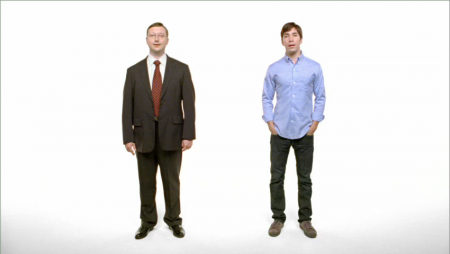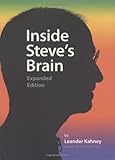57 Meditations on Kicking @$$ in Business and Life"4.8/5 stars" on Amazon
“Alienate the Non-Prospect” to Truly Dominate Your Market
Tweet CommentIs attracting people to your product always a good idea?
No!
No, attracting potential customers isn’t always a good idea because there is a cost to attracting certain prospects.

Apple is ok alienating 80%+ of computer prospects (represented by PC/Windows guy on the left) in order to attract hipper prospects like the Mac Guy (on right).
No comments yet | Continue Reading »
Thursday, June 16th, 2011
The Wall Street Journal Outlines 5 Secrets Of The Success Of Apple Stores
Tweet CommentGreat piece in the WSJ yesterday about the secrets of Apple stores.
I found these 5 “secrets” that the WSJ uncovered most interesting:
Sales Associatates “Don’t Sell”
…sales associates are taught an unusual sales philosophy: not to sell, but rather to help customers solve problems. “Your job is to understand all of your customers’ needs—some of which they may not even realize they have,” one training manual says. To that end, employees receive no sales commissions and have no sales quotas.
Soft/Comforting Language Used
The store’s confidential training manual tells in-store technicians exactly what to say to customers it describes as emotional: “Listen and limit your responses to simple reassurances that you are doing so. ‘Uh-huh’ ‘I understand,’ etc.”
Former Geniuses say they were told to say “as it turns out” rather than “unfortunately” to sound less negative when they are unable to solve a tech problem.
Strict Rules On Performance
Apple employees who are six minutes late in their shifts three times in six months may be let go. While there are no sales quotas, employees must sell service packages with devices, according to former employees. Those who don’t sell enough are re-trained or moved to another position, depending on the store.
Back on the sales floor, new hires must shadow more experienced colleagues and aren’t allowed to interact with customers on their own until they’re deemed ready. That can be a couple of weeks or even longer.
Keith Bruce, 23, who worked at an Apple store in Virginia for three-and-a-half years until December 2009, says he was told the sales floor was a stage where he should focus on things he can do, rather than things he can’t. If a customer mispronounced an item name, he was forbidden from correcting them because that would make them feel patronized.
No comments yet | Continue Reading »
Thursday, April 1st, 2010
Inside Tips From Apple & Steve Jobs
Tweet CommentI just finished reading a terrific book called Inside Steve’s Brain by Leander Kahney.
If you’re interested in Steve Jobs or Apple or technology or design, I highly recommend you read it.
I dog-eared a handful of pages of favorite bullets or quotes – here they are:
Beware the “Osborne Effect”
Jobs is careful to announce new technology (e.g. the Mac OS X) still under development before it’s ready to be sold…so as to avoid the “Osborne Effect”(named after the Osborne Computer Corporation) in which sales of existing technology or products being sold can be hurt.
The Osborne Computer Corp. took more than a year to get its next product available, ran out of cash and went bankrupt in 1985.
Borrowing Design Ideas Is Encouraged
The inspiration for the type of plastic case (a first for computers) for the Apple II came from Jobs seeing a Cuisinart food processor in the kitchen section of Macy’s.
Additionally, Jobs showed up at a design meeting for the Quicktime software product with a brochure from Hewlett-Packard with the H-P logo in a brushed metal.
The brushed metal ended up being adopted in across much of Apple’s software and some high-end hardware including the Safari Web browser and iCal calendar.
Design Tip: It’s More Important What You Leave Out Then What You Put In
Former Apple CEO John Sculley believed that a key part of Jobs’ greatness were decisions he made about things NOT to do.
Kahney points to an interesting study by Elke den Ouden, of the Eindhoven University, in which nearly half of products returned by consumers for refunds still work perfectly but new owners just couldn’t figure out how to use them.
Jobs and Apple are widely credited with keeping their product line lean and product functionality simple.
Another Design Tip: Functionality Is More Important Than How It Looks
Jobs explained in an interview with Wired in 1996 that:
“Design is a funny word. Some people think design means how it looks. But of course, if you dig deeper, it’s really how it worked. The design on fht eMac wasn’t what it looked like, although that was part of it. Primarily, it was how it worked…”
Apple’s Design Problem Solving
Apple designers subscribe to the “generate and test” approach to solving problems in which all the possible solutions are generated and tested to see if they offer a solution.
It’s key to use trial and error to make an “embarassing” number of solutions to get to one solution
Apple designers spends 10% of their time on traditional industrial design (brainstorming ideas, drawing, etc.) and 90% of their time working with manufacturing on implementing their ideas.
Jobs Doesn’t Believe In Focus Groups for Technology Products
He quotes the Henry Ford line: “If I’d asked my customers what they wanted, they’d have said a faster horse.”
The “Hero/Asshole RollerCoaster” Management Style
Kahney says he interviewed many people who work for Apple who say that the management style of Jobs and other Apple leaders is what is known as the “hero/asshole rollercoaster” in which there’s a constant tension at Apple between the fear of getting fire and a “messianic zeal” to change the world.
Apple’s Stock Plan
Apple employees can buy discounted stock of Apple in chunks based on their salary . The stock price is determined by the lowest price in the previous six months plus a small percentage discount.
Motives Are More Important Than Profits
“The older I get, the more I’m convinced that motives make so much difference,” Jobs is quoted in the book as saying.
“…our primary goal here is to make the world’s best PCs — not to be the biggest or richest.”
Great Steve Jobs Quote (from his 2005 Stanford commencement speech)
“Rembering that I’ll be dead soon is the most important tool I’ve ever encountered to help me make the big choices in life.
…have the courage to follow your heart and intuition. They somehow already know what you truly want to become. Everything else is secondary.”
I really recommend you read this book!

